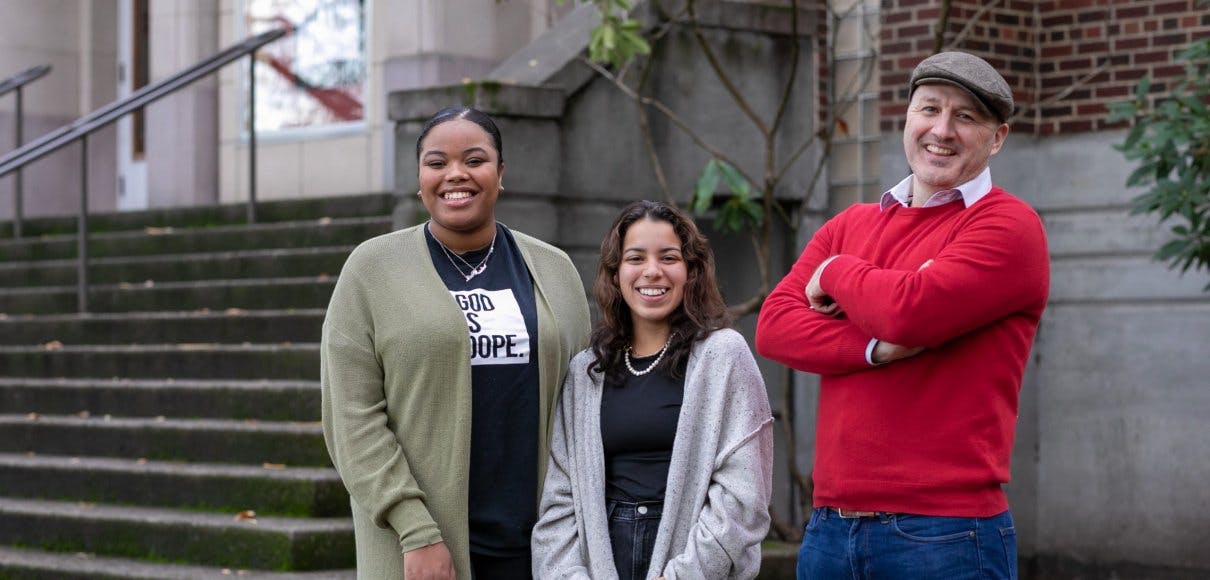When Mischa Willett started college in the late ‘90s, he encountered an academic environment that was completely unfamiliar to him — down to its language. “What’s a provost? I didn’t know what a syllabus was,” Willett said.
Looking back, he realizes it was about disconnection — not feeling part of a community. Willett dropped out. Twice. One professor went out of his way to check in with him which made all the difference.
Willett became the first in his family to complete college and is now an assistant professor of English and writing at SPU, as well as the program director for the Ascent Scholars Program which started in 2018.
The program is inspired by what co-founder and Vice Provost for Academic Affairs Cynthia Price calls a mandate — ethical, moral, and theological — to support all students.
“There is no reason that we can’t expect all students to succeed,” said Price, “but it is incumbent upon us to provide the curricular and co-curricular infrastructure to ensure their success.”
The two-quarter program recognizes that some students might find their first year of college particularly challenging for any number of reasons. Like Willett, they might be the first in their families to attend college, although first-generation status alone isn’t a predictor of college success. English might not be their native language. They might need to boost their research and writing skills for the college level.
Using in-house metrics, SPU invites first-year, first-time freshman to join a cohort dedicated to academic success.
It was the opportunity to have a mentor that drew in Ascent Scholar Mia Ewing. Now, it’s about all the small acts of connection — from a fall orientation just for Ascent Scholars and an ongoing group text among everyone in her cohort, to one-on-one check-ins with Willett and his invitations to join a campus seminar or play.
Based on its success, the program is expanding. Ascent began with one section of 20 students in 2018. Today, there are three sections for a total of 60 students in the program, overseen by additional faculty who are also first-generation college graduates.
For Ji-Young Um, assistant professor of English and cultural studies, it’s vital that students are seen for who they are, and not what a metric might suggest.
As with Willett, the connection is personal. Um moved to the United States from Korea when she was 10 years old, and, like many Ascent students, was also learning English.
Today, Um sees a side of her students other professors might not, from the weekly journal she assigns them.
“As a teacher, it is easy to dismiss a student who sits in the back and is often silent during classroom discussions as someone who may be unprepared, or someone who does not really care about the class,” she noted. “But this student may also be someone who has experienced trauma in the classroom in the past because of the way they speak as a non-native speaker or as a former English language learner.”
Witnessing not only her students’ struggles but also their strengths reminds her of the importance of caring for the whole student.
For Willett, leading the Ascent Scholars has changed the way he teaches. He used to think that students like him just needed someone to cajole them to work harder.
“I’ve softened tremendously,” Willett said. “I’ve changed completely — from a ‘toughen up soldier’ kind of stance to now I’m just their biggest cheerleader.”
For international business major Mayra Carrion, Willett is a unique kind of advocate.
“Dr. Willett ignited a passion for my own education that I didn’t have,” Carrion said. “I can tell he really cares, and it makes a world of difference.”
Since the pandemic, Willett notes, students are eager to buy in to community. This quarter, they all attended the campus production of “Blood/Water/Paint” and met up with Ascent alumni for dinner.
It’s these types of continuing connections that Willett hopes to foster and that students crave.
“I wish I was in it longer,” Carrion said, laughing. “There’s a stronger bond in this class compared to all my other classes.”
A four-year curriculum with peer mentoring and a senior capstone project is what Price and co-founder, former General Education Director Gail Moe, first envisioned and still hopes to see someday.
For Ewing, who is now exploring a major in physiology, the program isn’t what she expected — but in the best way.
“I expected everything to be stiff and structured in a college setting,” she says. “Though my other classes are like that, I get to breathe when I go to [Dr. Willett’s] class.”




